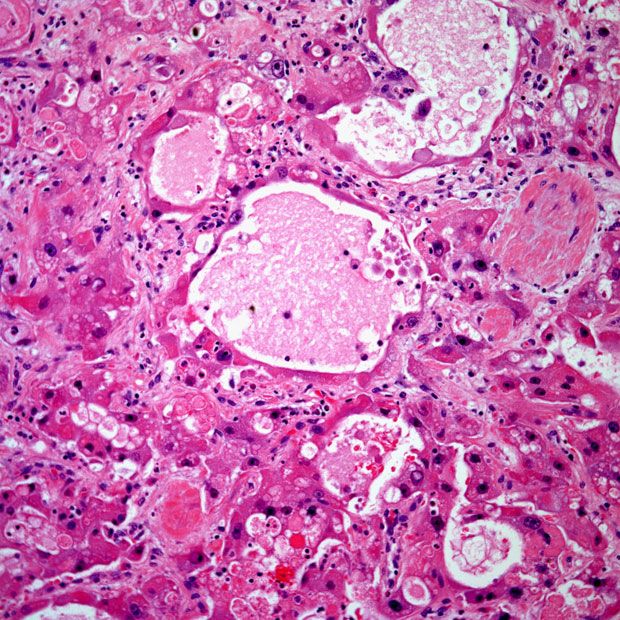FDA Accepts NDA for Rivoceranib/Camrelizumab in Unresectable HCC
The new drug application for rivoceranib plus camrelizumab in unresectable hepatocellular carcinoma is supported by findings from the phase 3 CARES 310 study.
Supporting data for the NDA came from the phase 3 CARES 310 study (NCT03764293), in which investigators assessed rivoceranib plus camrelizumab vs sorafenib among patients with unresectable HCC.

The FDA has accepted a new drug application (NDA) for rivoceranib in combination with camrelizumab as a frontline treatment for patients with unresectable hepatocellular carcinoma (HCC), according to a press release from Elevar Therapeutics, Inc.1
The regulatory agency has set a Prescription Drug User Fee Act date of May 16, 2024 for the NDA in this indication. Supporting data for the NDA came from the phase 3 CARES 310 study (NCT03764293), in which investigators assessed rivoceranib plus camrelizumab vs sorafenib (Nexavar) among patients with unresectable HCC.
“Rivoceranib plus camrelizumab has demonstrated the potential to improve the lives of those confronted with unresectable [HCC],” Saeho Chong, chief executive officer at Elevar, said in the press release. “With the FDA’s acceptance of our [NDA], we are pleased to reach another milestone in the development of this combination therapy.”
According to findings presented at the 2022 European Society for Medical Oncology Congress (ESMO), rivoceranib plus camrelizumab produced a median overall survival (OS) of 22.1 months (95% CI, 19.1-27.2) vs 15.2 months (95% CI, 13.0-18.5) with sorafenib (HR, 0.62; 95% CI, 0.49-0.80; P <.0001).2 Additionally, the median progression-free survival (PFS) was 5.6 months (95% CI, 5.5-6.3) and 3.7 months (95% CI, 2.8-3.7) in each respective treatment group (HR, 0.52; 95% CI, 0.41-0.65; P <.0001).
The confirmed objective response rate (ORR) was 25.4% (95% CI, 20.3%-31.0%) among patients receiving the experimental regimen vs 5.9% (95% CI, 3.4%-9.4%) among those receiving sorafenib. Moreover, efficacy findings from the overall study population generally extended across all patient subgroups, and the experimental regimen produced benefits in patients with hepatitis C virus-based etiology and those with non-viral etiology.
“This is the first positive international phase 3 study to report significant PFS and OS benefits with the combination of an immunotherapy and a small-molecule [tyrosine kinase inhibitor] over sorafenib for unresectable HCC,” lead investigator Shukui Qin, MD of the Department of Medical Oncology at the Cancer Center of Jinling Hospital, in Nanjing China said in a presentation on data from the CARES 310 study at ESMO.
In the open-label, international, multi-center phase 3 CARES 310 study, patients were randomly assigned to receive 200 mg of intravenous camrelizumab every 2 weeks plus 250 mg of rivoceranib orally each day (n = 272) or 400 mg of sorafenib orally twice a day (n = 271).
The primary end points of the study were PFS based on RECIST v1.1 criteria and OS. Secondary end points included time to progression, ORR, disease control rate, duration of response, and safety.
Patients 18 years and older with histopathologically or cytologically confirmed advanced HCC and no receipt of prior systematic treatment were eligible for enrollment. Additional eligibility criteria included having at least 1 measurable lesion per RECIST v1.1 guidelines, a life expectancy of at least 12 weeks, and adequate organ function.
The most frequent grade 3 or higher treatment-related adverse effects (TRAEs) included hypertension (37.5%), aspartate aminotransferase increase (16.5%), and alanine transaminase increase (12.9%) among patients receiving rivoceranib plus camrelizumab. The most common grade 3 or higher TRAEs for those receiving sorafenib were palmar-plantar erythrodysesthesia (15.2%) and hypertension (14.9%).
References
- Elevar Therapeutics announces FDA acceptance for filing of new drug application for rivoceranib in combination with camrelizumab as a first-line treatment for unresectable hepatocellular carcinoma. News release. Elevar Therapeutics, Inc. July 17, 2023. Accessed July 18, 2023. https://shorturl.at/oxBC8
- Qin S, Chan SL, Gu S, et al. Camrelizumab (C) plus rivoceranib (R) vs. sorafenib (S) as first-line therapy for unresectable hepatocellular carcinoma (uHCC): a randomized, phase III trial. Ann Oncol. 2022;33(suppl 7):LBA35. doi:10.1016/j.annomnc.2022.08.032.
Adapting to a Robotic Workstation for Image-Guided Liver Cancer Surgery
December 4th 2023Govindarajan Narayanan, MD, speaks to the potential time-saving advantages of using the Epione robot for microwave ablation, cryoablation, and other surgical strategies in patients with liver cancer and other tumors.